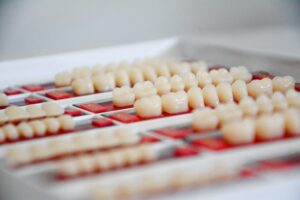You may have heard about tooth crowns – they’re like little hats for your teeth. But have you ever wondered how long these crowns last? Let’s dive into the world of tooth crowns, explore their lifespan, and learn how to take care of them to make them last even longer.
The Lifespan of a Tooth Crown
Tooth crowns can last a long time, but their lifespan isn’t the same for everyone. It depends on a few things:
Material Selection
Tooth crowns can be made of different materials, like porcelain, metal, ceramic, and zirconia. Some materials are more durable than others. For instance, metal crowns tend to last the longest. Porcelain and ceramic crowns are also quite durable, but they may not last as long as metal. The material your dentist chooses depends on where the crown is in your mouth and what you prefer.
Oral Hygiene
Taking good care of your teeth and gums plays a big role in how long your crown will last. If you brush and floss regularly and go to the dentist for check-ups, your crown is more likely to last a long time. Neglecting your oral hygiene can cause problems, like gum disease, that might affect your crown.
Tooth Location
Crowns on back teeth, like molars, usually face more wear and tear because they’re used for chewing. Crowns on front teeth may last longer because they’re not subjected to as much force. The location of your crown matters when it comes to longevity.
Signs Your Crown Needs Attention
Sometimes, your crown might need some TLC. Look out for these signs:
Pain or Sensitivity: If you experience pain or sensitivity when you eat or drink hot or cold things, it could be a sign of an issue with your crown.
Cracks or Chips: If you notice any cracks or chips in your crown, it’s time to visit your dentist. Small problems can become big ones if left untreated.
Loose Crown: If your crown feels loose or wiggly, don’t wait. Loose crowns can fall off, and that’s not something you want.
Extending the Lifespan of Your Tooth Crown
Want to keep your tooth crown in tip-top shape for as long as possible? Here’s how:
Daily Oral Care and Hygiene Practices
Brush your teeth gently with a soft-bristle toothbrush and non-abrasive toothpaste. Make sure to get all the nooks and crannies, including the gumline. Floss daily to remove food particles between your teeth.
Dietary Choices for Crown Protection
Be mindful of what you eat. Avoid biting into hard objects like ice or popcorn kernels. Chewing on these can damage your crown. Also, cut back on sugary foods and drinks to prevent tooth decay.
The Role of Mouthguards in Preventing Damage
If you’re into sports or grind your teeth at night, consider wearing a mouthguard. These protect your crown from accidental blows and prevent grinding-related damage.

Special Considerations for Different Crown Materials
Each crown material has its own pros and cons:
Porcelain Crowns: These are a popular choice for front teeth due to their natural appearance. They’re durable but can chip if subjected to excessive force.
Metal Crowns: Known for their longevity, metal crowns are tough but may not be ideal for front teeth because of their appearance.
Ceramic Crowns: Ceramic crowns are a good balance between durability and aesthetics. They’re less likely to chip compared to porcelain.
Zirconia Crowns: These crowns are strong and look quite natural. They’re a versatile option.
Repair vs. Replacement
If your crown has issues, it might be possible to repair it. Small problems can often be fixed. However, if the damage is extensive, you might need a replacement. Consult your dentist to determine the best course of action.
Extending the Life of Your Dental Crown: How Long Can It Really Last?
While dental crowns can last anywhere from five to eight years on average, with proper care, some crowns can even survive for many years longer. The lifespan of your crown depends on several factors, including the type of material used (porcelain, ceramic, zirconia), the dentist’s placement technique, your daily wear and tear, and your overall oral hygiene routine. To extend the life of your crown, practice good oral hygiene by brushing twice a day and flossing daily.
Regular dental exams and professional cleanings are also crucial for maintaining the health of your teeth and crowns. If you have any questions or concerns about your dental crown, consult your dentist for personalized advice
FAQs About Tooth Crowns
Q: Do crowns hurt when they’re placed?
A: During the procedure, you shouldn’t feel any pain because your dentist will use a local anesthetic to numb the area.
Q: Can I eat normally with a crown?
A: Yes, you can eat normally with a crown. Just be cautious with very hard or sticky foods.
Q: How much does a crown cost?
A: The cost varies depending on factors like location and the type of crown. It’s best to consult with your dentist for an accurate estimate.
In a nutshell, tooth crowns can last a long time if you take care of them. Choose the right material, practice good oral hygiene, and watch for any signs of trouble. If you do all that, your crown can give you a beautiful smile for many years to come. Don’t forget to visit your dentist regularly for check-ups to ensure your crown’s health.
Pacific Dental & Implant Solutions,
4211 Waialae Ave #102, Honolulu, Hawaii 96816
Find us on Yelp and Facebook
https://www.yelp.com/biz/pacific-dental-and-implant-solutions-honolulu
https://www.facebook.com/PDISHawaii/
